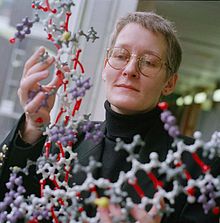Terri Attwood
Terri Attwood | |
|---|---|
 | |
| Born | Teresa K. Attwood 20 November 1959[4] |
| Alma mater | University of Leeds |
| Known for |
|
| Awards | Royal Society University Research Fellowship 1993–2002[1] |
| Scientific career | |
| Fields | Bioinformatics Protein fingerprinting |
| Institutions | |
| Thesis | Chromonic mesophases (1984) |
| Doctoral advisor | John E. Lydon[2] |
| Doctoral students |
|
| Website | |
Teresa K. Attwood (born 20 November 1959) is a professor of Bioinformatics in the Department of Computer Science and School of Biological Sciences at the University of Manchester and a visiting fellow at the European Bioinformatics Institute (EMBL-EBI).[5] She held a Royal Society University Research Fellowship at University College London (UCL) from 1993 to 1999 and at the University of Manchester from 1999 to 2002.[1]
Education
Attwood gained her
Research and career
Attwood undertook
Inspired by the creation of PROSITE, Attwood developed a method of protein fingerprinting and used this to establish the PRINTS[11][12][13] database. With Amos Bairoch she sought to unify work on protein family classification and annotation, eventually jointly securing a European Union grant with Rolf Apweiler to establish InterPro,[14][15] with Pfam, ProDom and Swiss-Prot/TrEMBL as consortium partners in 1997.[16]
Attwood has led major projects including the BioMinT FP5[17] text-mining consortium, the EMBER[18] bioinformatics education consortium (including EBI and Swiss Institute of Bioinformatics as partners), and the EPSRC PARADIGM Platform.[19] She is the Manchester principal investigator on projects SeqAhead (Next-generation sequencing data analysis network)[20] and AllBio (bioinformatics infrastructure for unicellular, animal and plant sciences),[21] and was also Manchester PI on EMBRACE[22] and EuroKUP (kidney and urine proteomics).[23] Attwood was a member of ELIXIR's Bioinformatics Training Strategy Committee (Work Package 11)[24] during ELIXIR's preparatory phase. She is currently Chair of the EMBnet Global Bioinformatics Network, she was a member of the Executive Committees of the International Society for Biocuration, and the Bioinformatics Training Network, and was recently elected to the Board of Directors of the International Society for Computational Biology. In 2012, she spearheaded the establishment of a GOBLET (Global Organisation for Bioinformatics Learning, Education and Training), with the major bioinformatics, computational biology and biocuration societies, networks and organisations as partners. As of 2016[update], Attwood is the Chair of the GOBLET Executive Board.[25][26]
As well as being a
Attwood's research has received funding from the Engineering and Physical Sciences Research Council,[37] the Biotechnology and Biological Sciences Research Council, the Wellcome Trust, the Royal Society, the European Union and industry.[6]
Teaching
Attwood teaches on
Academic service
Attwood serves on the editorial board of the Biochemical Journal,[41] Database: The Journal of Biological Databases and Curation,[42] Molecular and Cellular Proteomics,[citation needed] the Journal of Molecular Graphics and Modelling and the EMBnet.journal.[citation needed]
Awards and honours
Attwood held a Royal Society University Research Fellowship (URF) from 1993 to 2002.[1]
References
- ^ a b c Anon (2016). "Teresa Attwood Professor of Bioinformatics". manchester.ac.uk. Manchester. Archived from the original on 24 December 2016.
- ^ OCLC 59334329.
- .
- ^ Teresa Attwood at Library of Congress
- ^ 57193816586 Attwood, Teresa's publications indexed by the Scopus bibliographic database. (subscription required)
- ^ ORCID 0000-0003-2409-4235
- .
- ^ "Teresa K Attwood". biochem.ucl.ac.uk/bsm/dbbrowser.
- ^ Terri K. Attwood at DBLP Bibliography Server
- ^ Terri Attwood publications indexed by Google Scholar
- PMID 22508994.
- PMID 10592232.
- PMID 12520033.
- PMID 11125043.
- PMID 11159333.
- ^ a b http://www.biocurator.org/elec/candidates2011/Attwood.pdf Attwood biography from biocurator.org
- ^ "BioMinT: Biological Text Mining EU FP5 Quality of Life Project". Archived from the original on 19 June 2012.
- ^ "EMBER - European Multimedia Bioinformatics Educational Resource". www.bioinf.man.ac.uk.
- ^ "Platform grant: PARADIGM - Platform for Annotation, Robust Analysis, Data Integration & Genome Management". Retrieved 25 July 2012.
- ^ "COST Action: NGS-Data Analysis Network". Retrieved 25 July 2012.
- ^ "start – AllBio". Archived from the original on 29 December 2012.
- PMID 20462862.
- ^ "European Kidney and Urine Proteomics | Eurokup". Retrieved 25 July 2012.
- ^ "Welcome to ELIXIR". Retrieved 26 July 2012.
- ^ "Committees | GOBLET". www.mygoblet.org. 16 November 2014. Retrieved 24 August 2016.
- PMID 25189782.
- PMID 22434828.
- PMID 12376388.
- PMID 9852962.
- PMID 20823323.
- PMID 18629035.
- PMID 12967963.
- PMID 16159915.
- PMID 15691860.
- PMID 19534744.
- PMID 19929850.
- ^ Anon. "Grants awarded to Terri Attwood by the EPSRC". epsrc.ac.uk. Swindon. Retrieved 25 July 2012.
- ISBN 978-0-582-32788-7.
- ISBN 978-1-4051-0683-2.
- OCLC 951190363.
- ^ "Biochemical Journal Editorial Board". Archived from the original on 20 February 1999. Retrieved 25 July 2012.
- ^ "Oxford Journals | Life Sciences | Database | Editorial board". Retrieved 25 July 2012.
